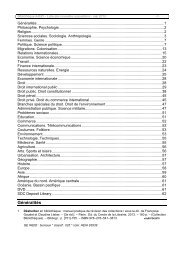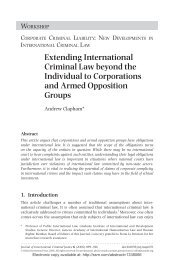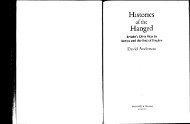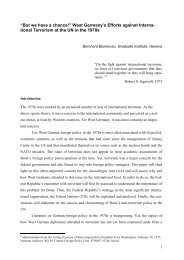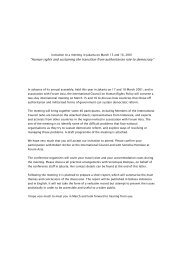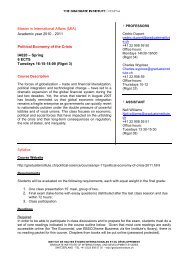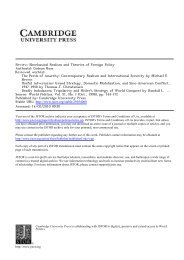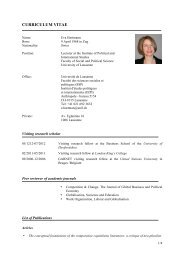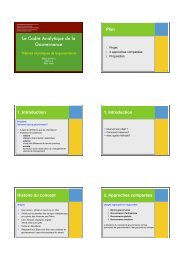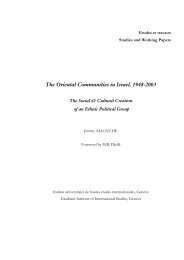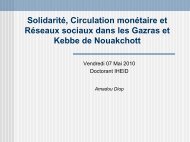Switzerland - The Graduate Institute, Geneva
Switzerland - The Graduate Institute, Geneva
Switzerland - The Graduate Institute, Geneva
Create successful ePaper yourself
Turn your PDF publications into a flip-book with our unique Google optimized e-Paper software.
INTERNATIONAL CENTER FOR RELIGION AND DIPLOMACY<br />
Address<br />
1156 Fifteenth St., NW, Suite 910, Washington,<br />
DC 20005<br />
Phone 202-331-9404<br />
Fax 202-872-9137<br />
Web www.icrd.org<br />
E-Mail postmaster@icrd.org<br />
Category Dialogue (Research & Knowledge)<br />
MISSION STATEMENT<br />
<strong>The</strong> mission of ICRD is to address identity-based conflicts that exceed the reach of traditional diplomacy by incorporating religion as<br />
part of the solution. Regardless of one's spiritual persuasion, there are two compelling reasons why the Center's work is important:<br />
(1) the need for more effective preventive measures to minimize the occasions in which we are forced to send our sons and<br />
daughters in harm's way and (2) the need for a stable global environment to support the kind of economic growth that can benefit<br />
an expanding percentage of the world's population. By linking religious reconciliation with official or unofficial diplomacy, ICRD has<br />
created a new synergy for peacemaking that serves both of these needs. It also provides a more fruitful approach for dealing with<br />
ethnic conflict, tribal warfare, and religious hostilities.<br />
Founding year Not indicated.<br />
BACKGROUND AND ACTIVITIES<br />
• Research: various publications, among others: "Faith-Based Diplomacy: Trumping Realpolitik", a book that explores how the<br />
peacemaking tenets of each of five different world religions can be strategically applied to conflicts in which those religions<br />
are centrally involved. It also makes the case for incorporating religious considerations into the practice of international<br />
politics.<br />
• Sudan: In addition to working behind the scenes to help bring this about, ICRD undertook two complementary institutional<br />
initiatives designed to ensure that once peace took hold, it would be lasting in nature.<br />
• Kashmir: ICRD has been working for 4 years with next-generation leaders on the Indian and Pakistani sides of the Line of<br />
Control (LOC) to promote "peace from within."<br />
• Iran: Since 2003, ICRD took part in exchanges and meetings within Iran but also with Senators and Congressmen to make<br />
them aware of the opportunities that exist for improving relations between Iran and the United States through religious<br />
channels.<br />
• Afghanistan: In partnership with the Washington-based <strong>Institute</strong> for Defense Analysis, ICRD conducted a series of policy<br />
workshops for US and South Asian policymakers and advisors.<br />
• United States: ICRD in partnership with the International <strong>Institute</strong> for Islamic Thought and the <strong>Institute</strong> for Defense<br />
Analyses (the Pentagon's leading think tank) convened a conference to explore how the U.S. government and the American<br />
Muslim community could begin working together for the common good.<br />
• Update Oct. 2006: In Pakistan, the center organizes workshops on curriculum enhancement and pedagogical reform of<br />
various groups of madrasas. <strong>The</strong> coverage includes involvements on three separate tracks: (1) in partnership with the<br />
<strong>Institute</strong> for Policy Studies in Islamabad, the center is conducting workshops for moderate madrasas from all five of the<br />
religious sects that sponsor these schools, (2) on an independent basis, the center is doing the same for the harder-line<br />
Deobandi madrasas in Balochistan, and (3) most recently, it has become engaged on a similar basis with the harder-line<br />
Wahhabi madrasas throughout the country. <strong>The</strong> latter two are particularly important in light of the impact their doctrine<br />
has had on Islamic extremists. <strong>The</strong> Center is now seeking funding to support the Wahhabi initiative.<br />
• Update Nov. 2006: Project Start in Syria: first faith-based reconciliation seminar which was co-sponsored with the<br />
Damascus-based Center for Islamic Studies. <strong>The</strong> seminar, which was led by ICRD Senior Vice President Brian Cox, brought<br />
12 Christians from the United States and the Middle East together with 18 Muslims from Syria.



![Download [pdf] - The Graduate Institute, Geneva](https://img.yumpu.com/23370020/1/190x248/download-pdf-the-graduate-institute-geneva.jpg?quality=85)
